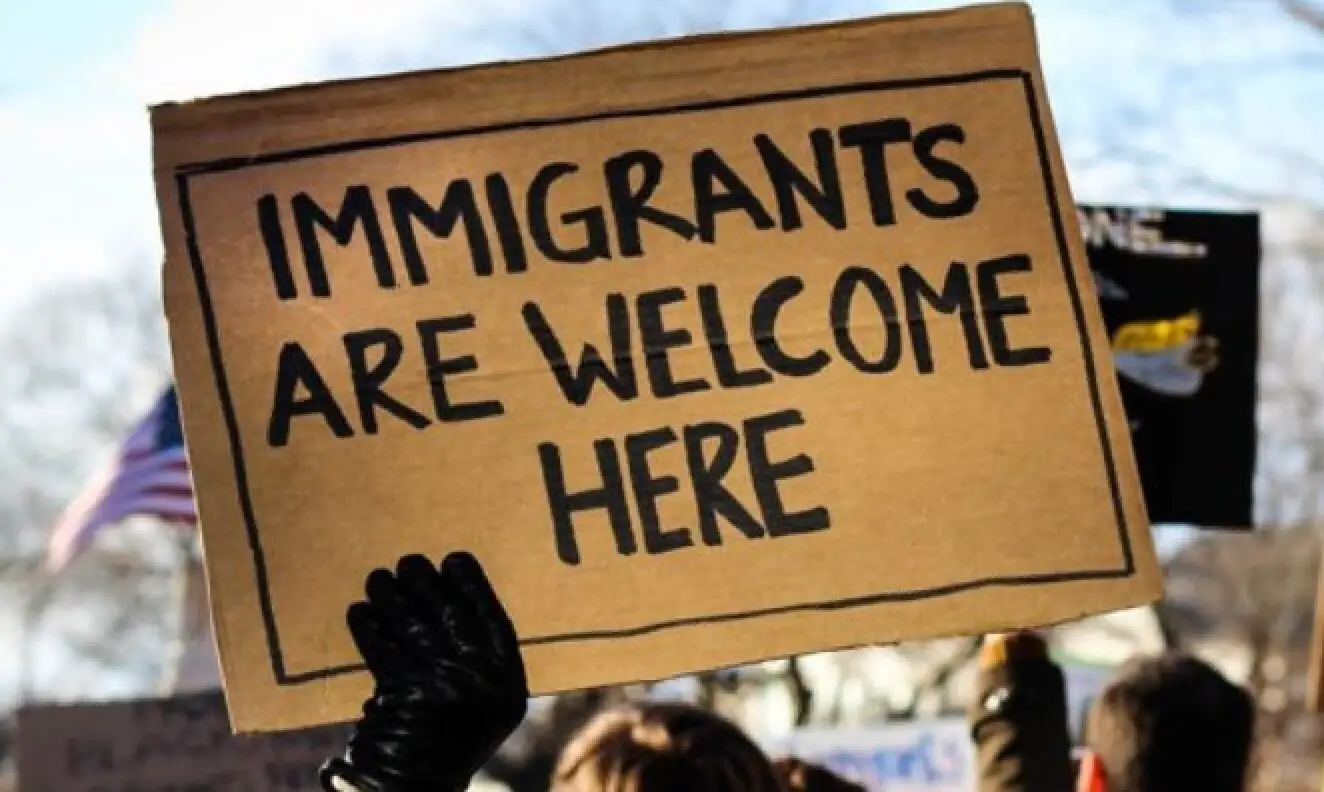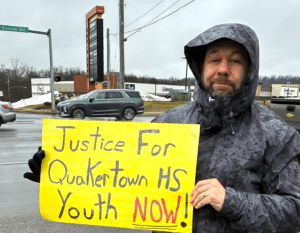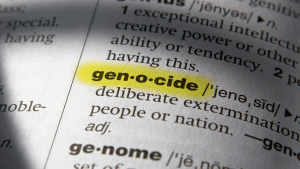The re-election of Donald Trump has raised fears throughout the immigrant community here in Bucks County. Trump’s racist rhetoric, threats of mass deportation, and the appointment of Tom Homan as “border czar” have led many to wonder what can be done to protect our undocumented neighbors.
Last week, Immigration Rights Action stepped in to address these concerns and help provide community members with the tools they need to confront the impending crisis. Attendance at the event was much higher than expected, with over 100 people gathered into Salem Church seeking guidance on how to be most effective.
Heidi Roux, Executive Director of Immigrant Rights Action, along with founding leaders Leslie Richards and Sue Ann Devito, gave a brief synopsis of the situation under the first Trump administration and what changes we can expect to see in the days ahead.
“Bucks County was a targeted area. We had ICE raids frequently along with policies that targeted sanctuary cities and counties in our community. People were afraid to come and get information that would protect them because of the fear that this stirred up,” Richards said.
The speakers noted that this second Trump administration is likely to be even more dangerous for Bucks residents than last time. They pointed to the expansion of private detention centers, threats of National Guard Deployment, and penalizations of local law enforcement officers who don’t meet quotas of mass arrests of undocumented immigrants.
What to do if Immigration Agents Come to Your Home
The threats and rhetoric from the incoming administration have many local immigrants on edge.
In attendance at the workshop were a young family of immigrants with four small children. While the children were born in the United States (and therefore legal citizens under current law), the parents are both undocumented. They have been in this country for over 20 years working and taking care of their children.
Miguel (name changed to protect identity) spoke emotionally about the anxiety he feels around the change in administration.
“I’m fearful. I’m afraid for my children. They’re still young. They need me. It’s a very important thing that I go to work every day to support them. But I don’t feel safe at work now,” he said. “I’m an immigrant because I came here for a better life. I want people to know that I’m here to get ahead with a purpose and that purpose is also for my children so that they can grow and get ahead.”
It isn’t only undocumented immigrants who are fearful. DACA recipients, legal permanent residents (green card holders), and even naturalized citizens have been threatened with deportation by members of Trump’s incoming administration.
Alicia, (name changed to protect identity), a young DACA mother at the event, spoke about her uneasiness. “People are feeling a lot of stress and frustration for sure, but I think overall, we have lived with this fear for so long that we know how to take care of ourselves, and either way we’re going to push through.”
Alicia handles the stress by making plans in case the worst case scenarios are realized.
“My husband is in the same boat with me, we’re both DACA holders and if something were to happen I wouldn’t want my children to be in a situation of having to go to foster care and then later having to fight for custody so I do have a plan in place … which is giving the legal guardianship of my children to one of my best friends who is a green card resident. If anything goes wrong, the kids have passports. We have our passport, and then we can be united,” she said. “I have two phone numbers of different lawyers, just in case something would happen again, they can help us out.”
While legal representation can be helpful for some immigrants, for many, there is simply no real path forward towards citizenship, which contributes to the feeling of helplessness felt by both undocumented people and also locals who are eager to help. This lack of hope can lead to despair and inaction for many.
But, for others, like local activist Cyndy Levy, idleness is not an option. When Levy came to her first immigration meeting in 2017, she didn’t speak Spanish and had no legal experience. Now she has a firm grasp of the language and is an accredited representative with the Department of Justice, which allows her to essentially work as an immigration lawyer through the DOJ.
Levy explained how the community came together in 2017 to combat the harsh GOP immigration policies.
“We were not an organization at that time. We were a group of neighbors. We weren’t even activists. We were really just ready to do whatever we could to help our neighbors,” Levy said. “Month to month, we were getting together and figuring out and making plans. ‘Oh, these people are going to need a ride. Oh, these people need somebody to go to court with them. Oh, this family is going to need this.’ It was very grassroots.”
Since 2017, Immigrant Rights Action has organized more formally as a nonprofit to address the immigrant community’s concerns. But, as Trump continues to lay out his deportation plans, it is clear that massive community effort will be needed to combat the dangers ahead.
READ: A Lehigh Valley Hospital Is Trying to Deport An Undocumented Comatose Patient
While there remain many unknowns about how the situation will unfold, Levy’s experiences have given her a lot of insight into how the community can step in as needed.
“We are at a point in time where we’re going to be making our own history, and we don’t know yet how that will look. I would say, show up, get ready, get involved, talk to other people. Find out what others are doing. If there’s something you can do that day, go do it.”
Levy gave an example of a recent fire in Norristown that displaced several undocumented immigrants.
“Local people showed up to try to figure out what they could do, helped people calm down, helped figure out how to find hotels for them for the next few weeks that wouldn’t get back to border patrol,” said Levy. “If you stay connected and informed you’ll learn about immediate needs like that and be able to step in and help. It will become clear one step at a time like it did last time.”
She noted that the first thing we can do is shift our thinking from “What can I do to help” to “What can we do to help?” Right after the meeting she put together a document listing online resources and immediate ways we can all take action … with the first step being simply to show up.
While it may seem like a small gesture, for people like Alicia, seeing a room full of people ready and willing to help can make a big difference.
“What gives me hope now is seeing all this community united and being together. I’m pretty sure that at any point in time, any of these people who are here will defend people against racist actions.” she said.







